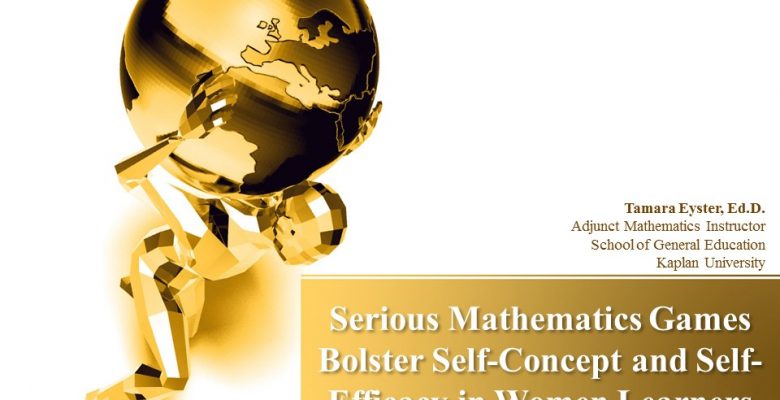Serious Math Games Bolster Self-Concept and Self-Efficacy in Women Learners
Abstract
Female adult learners face many challenges in education, and successful completion of mathematics courses continues to be one of these challenges. While there are many reasons for these challenges, two critical challenges are learners’ mathematics self-concept and mathematics self-efficacy. Do digital math games really help our female students be more confident in their math abilities? I have been researching this question for my dissertation and the answer is ‘Maybe’. In this presentation, I will share the types of students who participated, the games they played, and the results of my study. My participants completed the pretest, played digital games, and completed the posttest. The results were analyzed using the Mann Whitney U and the Wilcoxon Signed-Rank tests.
Outline
- Background & Research Problem
- Purpose & Research Questions
- Existing Literature
- Research Methods & Design
- Data Collection & Analysis
- Findings, Limitations & Conclusions
- Recommendations & Future Research
References
Abraham, R. A., Slate, J. R., Saxon, D. P., & Barnes, W. (2014). College-Readiness in Math : A Conceptual Analysis of the Literature. Research & Teaching in Developmental Education, 30(2), 4–34.
Ak, O. (2012). A game scale to evaluate educational computer games. Procedia – Social and Behavioral Sciences, 46, 2477–2481. http://doi.org/10.1016/j.sbspro.2012.05.506
Allen, T. O., & Zhang, Y. (2016). Dedicated to Their Degrees: Adult Transfer Students in Engineering Baccalaureate Programs. Community College Review, 44(1), 70–86. http://doi.org/10.1177/0091552115617018
Attali, Y., & Arieli-Attali, M. (2015). Gamification in assessment: Do points affect test performance? Computers & Education, 83, 57–63. http://doi.org/10.1016/j.compedu.2014.12.012
Charoenying, T. (2010). Accountable game design: Structuring the dynamics of student learning interactions. Journal of Educational Computing Research, 43(2), 135–163. http://doi.org/10.2190/EC.43.2.a
Digest of Education Statistics-Most Current Digest Tables. (2014). Retrieved from https://nces.ed.gov/programs/digest/current_tables.asp
Eyster, T. (2017) Serious Mathematics Games Bolster Self-Concept and Self-Efficacy in Women Learners (Doctoral dissertation, Northcentral University). http://wp.me/p9dxda-u
Finlayson, M. (2014). Addressing math anxiety in the classroom. Improving Schools, 17(1), 99–115. http://doi.org/10.1177/1365480214521457
Fu, F.-L., Su, R.-C., & Yu, S.-C. (2009). EGameFlow: A scale to measure learners’ enjoyment of e-learning games. Computers and Education, 52, 101–112. http://doi.org/10.1016/j.compedu.2008.07.004
Jameson, M. M., & Fusco, B. R. (2014). Math anxiety, mathematical self-concept, and mathematical self-efficacy in adult learners compared to traditional undergraduate students. Adult Education Quarterly, 64(4), 306–322. http://doi.org/10.1177/0741713614541461
Naik, N. (2015). The use of GBL to teach mathematics in higher education. Innovations in Education and Teaching International, 3297, 1–9. http://doi.org/10.1080/14703297.2015.1108857
O’Rourke, E., Butler, E., Liu, Y.-E., Ballweber, C., & Popović, Z. (2013). The effects of age on player behavior in educational games. Foundations of Digital Games. Retrieved from http://homes.cs.washington.edu/~eorourke/papers/age_behavior_fdg.pdf
Whitbourne, S. K., Ellenberg, S., & Akimoto, K. (2013). Reasons for playing casual video games and perceived benefits among adults 18 to 80 years old. Cyberpsychology, Behavior, and Social Networking, 16(12), 892–7. http://doi.org/10.1089/cyber.2012.0705
Presented
June 14, 2017 @ General Education Conference, Kaplan University, online
